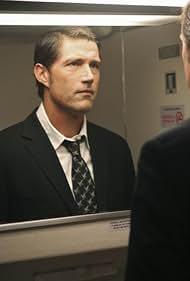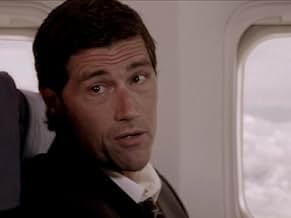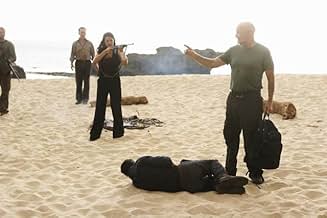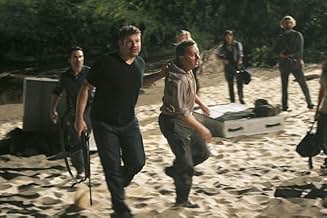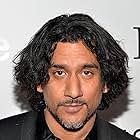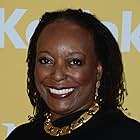LA X: Part 1
- Episode aired Feb 2, 2010
- TV-14
- 41m
IMDb RATING
8.6/10
6.4K
YOUR RATING
Flight 815 is shown successfully landing in Los Angeles with no crash on the island, but the survivors are simultaneously shown still on the island after Juliet detonates the bomb.Flight 815 is shown successfully landing in Los Angeles with no crash on the island, but the survivors are simultaneously shown still on the island after Juliet detonates the bomb.Flight 815 is shown successfully landing in Los Angeles with no crash on the island, but the survivors are simultaneously shown still on the island after Juliet detonates the bomb.
Emilie de Ravin
- Claire Littleton
- (credit only)
Storyline
Did you know
- TriviaMichael and Walt do not appear on the flight in the "flash-sideways".
- GoofsWhen Sayid looks at Nadia's picture for the first time the passport is Iranian and not Iraqi. The second time the passport's color is green, but Iranian passports are dark red.
- Quotes
Charlie Pace: You should have let that happen, man. I was supposed to die.
- ConnectionsReferences Crocodile Dundee (1986)
Featured review
The final season of Lost begins with "LA X, Part 1," an episode that boldly introduces the concept of alternate timelines, setting the stage for the show's concluding arc. Directed by Jack Bender, this episode is marked by its daring narrative structure, juxtaposing the familiar and the new as the characters navigate two parallel realities: one where Oceanic Flight 815 never crashed and another where the survivors deal with the aftermath of the detonation of the hydrogen bomb. The episode's complexity and the introduction of these dual realities signal a season that will challenge both the characters and the audience.
The performances in this episode are strong, with Matthew Fox's portrayal of Jack once again taking center stage. Fox effectively conveys Jack's confusion and determination as he grapples with the repercussions of the bomb's detonation. In the alternate reality, his encounter with characters like Locke, played by Terry O'Quinn, adds an intriguing layer of tension and foreshadowing, particularly given the history between these two figures. The supporting cast, including Evangeline Lilly as Kate and Jorge Garcia as Hurley, also shine as they navigate these divergent timelines, bringing subtle variations to their characters that hint at the unfolding mystery.
The script, written by Damon Lindelof and Carlton Cuse, is dense with plot and character development. The pacing is brisk, with the episode moving fluidly between the two timelines, allowing viewers to see familiar events play out in unfamiliar ways. The writing deftly balances the introduction of new questions with the resolution of old ones, maintaining the show's hallmark sense of mystery. The dialogue is sharp, filled with the kind of existential musings and emotional confrontations that Lost has always excelled at, making this premiere a compelling start to the final season.
Visually, "LA X, Part 1" is stunning. The cinematography by Stephen McNutt captures both the eerie tranquility of the island and the bustling chaos of Los Angeles, providing a stark contrast between the two realities. The direction utilizes these visual differences to highlight the characters' sense of displacement and confusion. The use of close-ups emphasizes the emotional stakes, while wide shots of the island and cityscapes underscore the vastness of the characters' journey.
The sound design and Michael Giacchino's score play a crucial role in setting the tone for this episode. Giacchino's music, with its familiar themes, evokes a sense of nostalgia while also suggesting the weight of what's to come. The sound effects, particularly in the scenes involving the island, enhance the tension and unease that permeates the narrative. The contrasting soundscapes between the two realities also serve to underscore the duality of the episode's structure.
In conclusion, "LA X, Part 1" is a bold and compelling start to Lost's final season. Strong performances, particularly from Matthew Fox, combined with a dense and intriguing script, dynamic cinematography, and an evocative score, make this episode a fitting beginning to the end of the series. The episode's exploration of alternate realities sets the stage for a season that promises to challenge the characters and the audience in equal measure.
The performances in this episode are strong, with Matthew Fox's portrayal of Jack once again taking center stage. Fox effectively conveys Jack's confusion and determination as he grapples with the repercussions of the bomb's detonation. In the alternate reality, his encounter with characters like Locke, played by Terry O'Quinn, adds an intriguing layer of tension and foreshadowing, particularly given the history between these two figures. The supporting cast, including Evangeline Lilly as Kate and Jorge Garcia as Hurley, also shine as they navigate these divergent timelines, bringing subtle variations to their characters that hint at the unfolding mystery.
The script, written by Damon Lindelof and Carlton Cuse, is dense with plot and character development. The pacing is brisk, with the episode moving fluidly between the two timelines, allowing viewers to see familiar events play out in unfamiliar ways. The writing deftly balances the introduction of new questions with the resolution of old ones, maintaining the show's hallmark sense of mystery. The dialogue is sharp, filled with the kind of existential musings and emotional confrontations that Lost has always excelled at, making this premiere a compelling start to the final season.
Visually, "LA X, Part 1" is stunning. The cinematography by Stephen McNutt captures both the eerie tranquility of the island and the bustling chaos of Los Angeles, providing a stark contrast between the two realities. The direction utilizes these visual differences to highlight the characters' sense of displacement and confusion. The use of close-ups emphasizes the emotional stakes, while wide shots of the island and cityscapes underscore the vastness of the characters' journey.
The sound design and Michael Giacchino's score play a crucial role in setting the tone for this episode. Giacchino's music, with its familiar themes, evokes a sense of nostalgia while also suggesting the weight of what's to come. The sound effects, particularly in the scenes involving the island, enhance the tension and unease that permeates the narrative. The contrasting soundscapes between the two realities also serve to underscore the duality of the episode's structure.
In conclusion, "LA X, Part 1" is a bold and compelling start to Lost's final season. Strong performances, particularly from Matthew Fox, combined with a dense and intriguing script, dynamic cinematography, and an evocative score, make this episode a fitting beginning to the end of the series. The episode's exploration of alternate realities sets the stage for a season that promises to challenge the characters and the audience in equal measure.
- fernandoschiavi
- Aug 15, 2024
- Permalink
Details
Contribute to this page
Suggest an edit or add missing content

